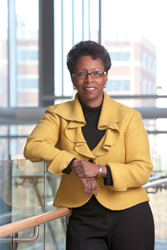SOP’s Eddington Elected to National Leadership Position
Chair-elect appointment of AACP’s Council of Deans recognizes dean’s expertise and leadership in the field of pharmacy education.
By Malissa Carroll
February 5, 2015
Natalie D. Eddington, PhD, FAAPS, FCP, dean and professor of the University of Maryland School of Pharmacy and executive director of University Regional Partnerships, has been voted chair-elect of the American Association of Colleges of Pharmacy’s (AACP) Council of Deans. Her volunteer appointment begins in July 2015, and she will become chair of the council in July 2016.
“It is a tremendous honor to be named chair-elect of AACP’s Council of Deans for the premier organization representing pharmacy education in the United States,” says Eddington. “This appointment will offer me the unique opportunity to work with deans from other colleges and schools of pharmacy across the nation and AACP’s leadership in a collective effort to advance pharmacy education and the profession.”
Eddington was elected by her fellow members of the Council of Deans, which is comprised of deans and leaders of AACP’s 125 member schools and colleges of pharmacy. The group works to identify and address important issues related to the conduct of professional, post-professional, and graduate education, research, and service in pharmacy and the pharmaceutical sciences. As chair-elect, Eddington will work with other members of the council to address these matters by facilitating discussions among AACP committees, liaising with representatives on the organization’s Board of Directors, and assisting with the development of professional reports for the organization’s member institutions.
An overriding theme for the Council is to address policy-relevant issues, which can ultimately be helpful to AACP, as well as locally, regionally and nationally to individual colleges and schools and to advocate for the betterment of the pharmacy education and the profession.
“I am excited to further strengthen relationships with pharmacy educators and policy makers across academia, government, and industry and to address important issues that affect not only the pharmacy profession, but also public health,” says Eddington.
“Dean Eddington will bring many important perspectives and a great deal of valuable experience to the AACP Board,” said Lucinda L. Maine, RPh, PhD, executive vice president and CEO of AACP. “It is an especially important time in our Association as we are embarking upon a new strategic planning process and seeing major initiatives mature. These include our work in interprofessional education and in innovative educational technologies such as serious game development.”
Eddington became dean of the University of Maryland School of Pharmacy in August 2007 after serving as chair of its Department of Pharmaceutical Sciences. She graduated summa cum laude with a BS in pharmacy from Howard University. She earned her PhD from the University of Maryland School of Pharmacy and, after working as assistant director of new drug development at Pfizer Inc., joined the faculty in 1991. She was appointed director of the School of Pharmacy’s Pharmacokinetics/Biopharmaceutics Laboratory in 1999, and became chair of the Department of Pharmaceutical Sciences in 2003.
Eddington is a nationally known expert in drug delivery and pharmacokinetics, the movement of drugs in the body. Her research focuses on cancer therapy and treatments for disorders of the central nervous system. Her work has been supported by funding from the National Cancer Institute, the National Institute of Mental Health, the National Institute on Drug Abuse, the U.S. Food and Drug Administration, and the pharmaceutical industry.
In 2014, she was named executive director of University Regional Partnerships at the University of Maryland, Baltimore (UMB), a position she assumes while maintaining her leadership of the School of Pharmacy. In this role, Dr. Eddington assists UMB’s senior vice presidents, working collaboratively with the deans, on issues related to the expansion of the University’s academic and research programs in Montgomery and Prince George’s counties.
Established in 1900, AACP is the national organization that represents pharmacy education in the United States. Its membership includes all accredited colleges and schools of pharmacy with degree programs accredited by the Accreditation Council for Pharmacy Education, including more than 6,400 faculty; 62,500 students enrolled in professional programs; and 5,100 individuals pursuing graduate education. The organization’s mission is to lead and partner with its members to advance pharmacy education, research, scholarship, practice, and service to improve societal health.



